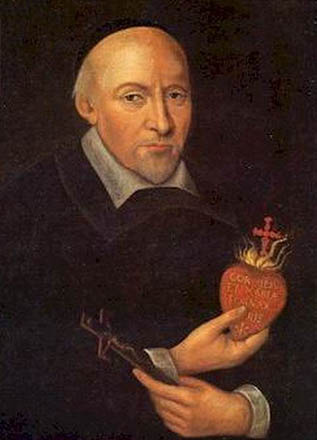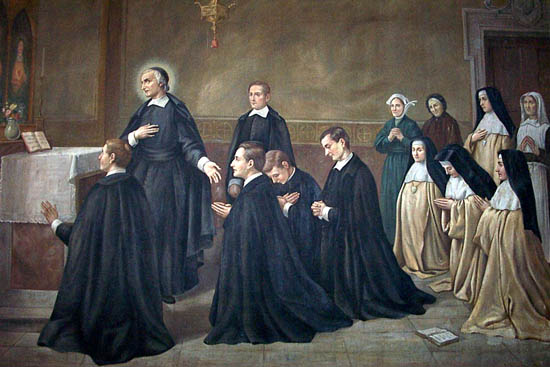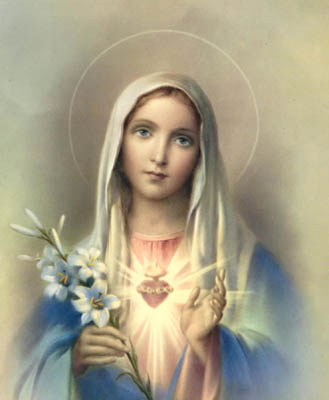 St. John Eudes, Confessor from the Roman Breviary
John was born in the year 1601, of pious and respectable parents, at a village commonly known as Ri, in the diocese of Seez. While still a boy, when he was fed with the bread of Angels, he cheerfully made a vow of perpetual chastity. Having been received at the College of Caen, directed by the Fathers of the Society of Jesus, he was conspicuous for a remarkable piety; and, committing himself to the protection of the Virgin Mary, when still a youth he signed with his own blood, the special covenant he had entered into with her. Having completed his courses of letters and of philosophy with great distinction, and having spurned opportunities of marriage which had been arranged for him, he enrolled himself with the Congregation of the Oratory [founded by Cardinal] de Berulle, and was ordained priest at Paris. He was on fire with a marvelous love towards his neighbor: for he took the most constant pains in caring for both the souls and bodies of those smitten with the Asiatic plague, in many different places. He was made Rector of the Oratorian house at Caen, but since he had been thinking for a long time of educating suitable young men for the ministry of the Church, earnestly asking for the divine assistance, with a brave spirit he most regretfully departed from the associates with whom he had lived for twenty years.
 St. John Eudes with fathers and sisters of the congregations founded by himself
Accordingly, associating five priests with himself, in the year 1643, on the feast-day of the Annunciation of the Blessed Virgin Mary, he founded a Congregation of Priests, to whom he gave the most holy names of Jesus and Mary, and opened the first Seminary at Caen; and a great many others followed immediately in Normandy and Brittany, also founded by him. For the recalling of sinful women to a Christian life, he founded the Order of Our Lady of Charity; of which most noble tree, the Congregation of the Good Shepherd of Angers is a branch. Furthermore, he founded the Society of the Ad-mirable Heart of the Mother of God, and other charitable institutions. He was the author of many excellent treatises, and labored as an Apostolic Missionary to the very end of his life, preaching the Gospel in very many villages, and cities, and even in royal court.
His matchless zeal was very conspicuous in promoting the salutary devotion towards the most sacred Hearts of Jesus and Mary, whose liturgical worship he was the first of all to devise, although not without some divine inspiration. He is therefore held to be the father, the teacher, and the apostle of that worship. Courageously withstanding the doctrines of the Jansenists, he preserved unalterable obedience towards the chair of Peter, and he constantly prayed to God, both for his enemies as well as for his brethren. Broken by so my labors, rather than by years, desiring to be freed and to be with Christ, on August 19th, 1680, frequently repeating the sweet names of Jesus and Mary, he died in peace. As he became illustrious by many miracles, Pope Pius X added him to the list of the blessed, and as he still shone forth with new signs and wonders, Pope Pius XI, in the holy year [1925] and on the day of Pentecost, placed him among the Saints, and extended his office and Mass to the universal Church.  Salutation to the Glory of Mary by St. John Eudes
Hail Mary! Daughter of God the Father,
Quote of St. John Eudes on the Lost
Hail Mary! Mother of God the Son, Hail Mary! Spouse of God the Holy Ghost, Hail Mary! Temple of the Most Blessed Trinity, Hail Mary! Celestial Rose of the ineffable love of God. Hail Mary! Virgin pure and humble, of whom the King of Heaven willed to be born and with thy milk to be nourished. Hail Mary! Virgin of virgins, Hail Mary! Queen of Martyrs, whose soul a sword transfixed, Hail Mary! Lady most Blessed! unto whom all power in Heaven and earth is given, Hail Mary! my Queen and my Mother! my Life, my Sweetness, and my Hope, Hail Mary! Mother most Amiable, Hail Mary! Mother most Admirable, Hail Mary! Mother of Divine Love, Hail Mary! Immaculate; Conceived without sin! Hail Mary! Full of Grace! the Lord is with thee! Blessed art thou among women! And blessed is the Fruit of thy womb, Jesus! Blessed by thy Spouse, St. Joseph, Blessed by thy Father, St. Joachim, Blessed by thy Mother, St. Anne, Blessed by thy Guardian, St. John, Blessed by thy Holy Angel, St. Gabriel, Glory be to God the Father, Who chose thee, Glory be to God the Son, Who loved thee, Glory be to God the Holy Ghost, Who espoused thee, Glorious Virgin Mary, may all men love and praise thee, Holy Mary, Mother of God! pray for us and bless us, now and at death in the Name of Jesus, thy Divine Son! Amen
Saint John Eudes (died A.D. 1680): "If I had died as a pagan, a heretic, or an apostate, you would have reason indeed to weep. [...] Weep! Weep! Burst into tears, tears of blood! For those are the people who are really dead. [...] It is for such a death that one must shed tears of blood, for those who have not lived as Christians. [...] Let infidels and heretics, let the relatives and the friends of bad Catholics weep without consolation and weep unceasingly for the death of their departed ones!"
Magnificat of Saint John Eudes A Hymn of Praise and Thanksgiving to the Sacred Heart of Jesus and to the Holy Heart of Mary
My soul doth magnify the admirable Heart of Jesus and Mary,
And my spirit rejoices in my great Heart. Jesus and Mary have given me their Heart, This immense Heart in order that all in me May be performed in its love. Infinite thanks to them for their ineffable gift. This heart infinitely merciful has done great things for me; It has possessed me from the womb of my mother. Infinite thanks for His ineffable gifts. The abyss of my misery has called on the abyss of His Mercy. Infinite thanks for His ineffable gifts. This Heart infinitely meek has presented me With blessings of its sweetness. Infinite thanks for His ineffable gifts.
Excerpts from Papal Documents Concerning St. John Eudes and the Devotion to the Sacred Heart of Jesus:
Auctor cultus lilurgici sacrorum Cordium. "The institutor of the lilurgical worship of the Sacred Hearts."--Leo XIII in the Decree on the Heroism of the Virtues of John Eudes, January 6. 1903
"But his services to the Church received a vast increase when, burning with a singular love for the most holy Hearts ot Jesus and Mary, he was the first to think, not without some divine inspiration, of offering to them liturgical worship. Of this sweet devotion of piety, therefore, he is to be considered the father, since from the beginning of his congregation of priests he provided that the feasts of those Sacred Hearts should be celebrated among them; the doctor also, for he composed special offices and masses in their honor; and finally the apostle, for he strove with all his might to spread everywhere this salutary devotion.--Pius X in the Decree of Beatification, December 13, 1908. The zeal of John Eudes reached its peak when in 1670, after a mission at Rennes and the foundation of a seminary in that town, he was able there to celebrate for the first time the Feast of the Sacred Heart of Jesus, with the approval of the Ordinary, with which a great number of prelates hastened to concur. Two years later, the saintly founder explicityly ordained that the Feast be celebrated in all the houses of his congregation as the patronal feast. Pius X, Our Predecessor of illustrious memory, sanctioned these two feasts, celebrated by the Eudistic: family, and authorized as the day of the solemnity, February 8th for the Feast of the Holy Heart of Mary, and October 20 for the Sacred Heart of Jesus. This endeavour to spread the devotion to the Sacred Hearts, of which he is the Father, the Doctor and the Apostle, stirred up the hatred of the Jansenists, who made him suffer many trials; his invincible courage supported them for the love of God and the salvation of souls.--Pius XI in the Decree of Canonization, May 31, 1925 "Lastly, in more recent centuries, especially at the time when heretics by propagating false piety were striving to turn the faithful away from the Blessed Eucharist, the public devotion to the Sacred Heart saw its beginnings. This was due primarily to the work of St. John who rightly deserves to be called the institutor of the liturgical worship of the Sacred Hearts of Jesus and Mary."--Office for the Feast of the Sacred Heart of Jesus, Matins. Second Nocturn, Lesson 4. http://catholicharboroffaithandmorals.com/ |